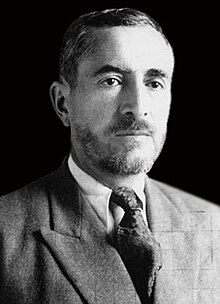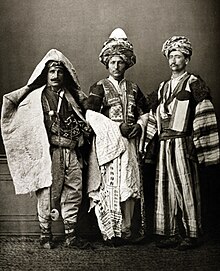Kurdish people
The Kurds or Kurds are an Iranian people who inhabit the mountainous region of Kurdistan, in Western Asia, divided mainly among the sovereign states of Syria, Iraq, Turkey and Iran. There is also a Kurdish population in a larger geographical area, stretching from the Taurus Mountains to the western plateaus of Iran; and from Mount Ararat to the foothills adjoining the Mesopotamian plains, with significant enclaves in far eastern Syria and in Armenia and the Nakhchivan Autonomous Province of Azerbaijan. Kurds are mostly Sunni Muslims, although a significant minority still follow the traditional Kurdish religion, Yazidism.
Although Kurds are distinguished by elements such as language, Kurdish, idiomatic variants exist throughout Kurdistan. In Turkey, Kurds speak Kurmanyi (or Northern Kurdish) and Zaza. Sorani is spoken in northern Iraq, and the Kurds of Iran, in addition to Sorani and Kurmani, also speak different dialects in the south-east of the country.
The Kurdish people are the largest ethnic minority in the Middle East not established in some form of nation state. They number between 36.4 and 45.6 million people—according to 2016 estimates, although there are no official censuses—, living mainly (in descending order) in Turkey, Iran, Iraq and Syria. There is also a significant Kurdish diaspora in the European Union and some post-Soviet states.
After the First World War, in which they supported the allies against the Ottoman Empire, the Kurds achieved through the Treaty of Sèvres the recognition of the independence of their country. However, this international agreement was never ratified and was replaced by the Treaty of Lausanne which led to the partition of the Ottoman Empire.
Kurdish means "hero" in Persian language.
History
Old Age
The history of the Kurdish people begins in 612 BC. They are one of the indigenous peoples of the plains and highlands of Mesopotamia. However, neither scholars nor the Kurdish people agree on the origins of the group. One of the theories indicates that the Kurds are direct descendants of the Medes, the empire that dominated the area until its annexation by the Persian Empire in 549 BC. C.
There is documentation of the presence of the Kurds from the IV century BC. C. The Greek historian Xenophon, in his book Anabasis, recounts a Kurdish expedition through the Anatolian peninsula. As a people, they faced Achaemenid Assyria, being defeated in 550 BC. C.
Middle Ages
During the Muslim expansion, the Kurds would end up converting to Islam, but without losing their language and distinctive identity despite being divided into numerous principalities that were disputed between the Ottoman and Persian Empires.
The Kurdish sultan Saladin (1138-1193) was the son of Ayyub, governor of Tikrit, and nephew of Shirkuh, lieutenant of Nur al-Din, lord of Syria (1146-1174). Shirkuh took control of the Fatimid Caliphate of Egypt (1169) in a military campaign paid for by Nur al-Din and the same year it was inherited by Saladin on the death of his uncle. He dissolved the Caliphate of Cairo (1171) and proclaimed himself sultan of Egypt, entered into a dispute with Nur al-Din, his lord. On the death of Nur al-Din (1174) he seized power in Syria, as far north as Armenia, to the west Mosul and Kurdistan (1186), and with much of the Crusader States (1187).
Modern Age
During the Turkish-Persian War (1730-1736), the Kurds supported the Ottomans because they promised them more autonomy.
Contemporary Age
The Treaties of Sèvres and Lausanne
With the end of World War I, the victorious powers divided up the Middle East into areas of influence through the Sykes-Picot Agreement. Subsequent conferences in the city of Sèvres discussed the way in which the territories that had been under the rule of the Ottoman Empire would be divided. The President of the United States, Woodrow Wilson, sent the King Crane Commission to discuss in the negotiations the issue of the creation of an independent Armenian state (Wilsonian Armenia). Later, the Commission recommended the creation of Kurdistan in a quarter of Anatolian territory. The report suggested that both states would be administered as United States mandates.
At the negotiating table, France accepted the creation of a Kurdish state, with the reservation that it would not include any of the Kurdish territories that had been guaranteed to the French by the Sykes-Picot Agreement. In addition to France, the participants in the Sèvres Conference included the United Kingdom, the United States (as an observer), Italy, Japan, Armenia, Belgium, Greece, Hejaz (now Saudi Arabia), Poland, Portugal, Romania, the Serb-Croat state -Slovene (later Yugoslavia), Czechoslovakia, Turkey and a Kurdish delegation that acted as an observer in the discussions concerning Kurdistan. The result of the conference was a draft treaty of 433 articles, signed at Sèvres on August 10, 1920 but never entered into force as the parties concerned have not ratified it. Although the Treaty and specifically article 62 defined the borders and the hypothetical composition of the future Kurdistan, many Kurdish-majority territories located west of the Euphrates were excluded.
In response to the Treaty of Sèvres, General Mustafa Kemal Atatürk and Turkish nationalist groups put into practice their plans for the liberation of Turkey from foreign occupation, a consequence of the partition of the Ottoman Empire. The Turkish war of independence achieved its greatest military victory through the Battle of Dumlupinar, which culminated on September 9, 1922 with the defeat of the Greek army in the Aegean and western Anatolia. For their part, the Allies were quick to recognize the de facto political independence of the new republic, fearing that Kemalist Turkey might go over to the Soviet camp. Based on this reasoning, the Treaty of Lausanne, signed by the United Kingdom, France, Italy, Japan, Greece, Romania, the Serb-Croat-Slovene kingdom and Turkey on July 24, 1923 recognized –de jure - to the Turkish state and divided the territory of the Kurds.
The Treaty of Lausanne was a victory for the Turks. However, for the Kurds, it marked the beginning of a new phase of subjugation. Articles 40 to 45 specified that the minorities in question were "non-Muslim minorities" (Armenians, Greeks etc.). The Ankara nationalist authorities refused to include them among the minorities protected by constitutional provisions. At the same time, the Turkish authorities adopted demographic policies intended to encourage Turks to return and balance the weight in their favor in the new republic. From this moment on, the Kurdish insurrection became an endemic phenomenon within the framework of the Middle East, characterized by armed uprisings in Turkey, combined with periods of confrontation in Iran and Iraq.
Since 1945
After the end of the Second World War in Europe in 1945, the Kurds asked the UN for the independence of their territory. In 1946 the Republic of Mahabad (Iran) was founded, lasting one year.
In 1978 Abdullah Öcalan founded the Kurdistan Workers' Party (PKK), which began to operate in Turkey. In 1984 the PKK launched an open war against Turkey. With 10,000 guerrillas and more than 50,000 active militants, the conflict involved a total of 40,000 killed and 3,000 Kurdish villages destroyed until 1999, when Öcalan was arrested and PKK militants laid down their arms. Meanwhile, the Halabja chemical attack in 1988 was perpetrated against the Kurdish population of Iraq. However, since the fall of Saddam Hussein's regime after the invasion by the United States and its allies in 2003, the Kurds, who actively collaborated with the allied occupation troops, were granted the creation of the Kurdistan Autonomous Region.
As part of the Syrian civil war that began in 2011, President Bashar al-Assad promulgated a decree granting citizenship to the inhabitants of Kurdish origin, which they had been deprived of since 1962. Since 2014 they have resisted the jihadist invasion of the Islamic State and have defended themselves from the establishment of their caliphate in Kurdish territory.
Nationalism
The Kurdish independence movement arose in the early 19th century century.
- Abdullah Ocalan, leader of the PKK sentenced to life imprisonment, a writer of political essays proposing a democratic solution to the conflict of the Kurdish people.
- Ali ibn al-Athir (12 May 1160-1233) was a Muslim Kurdish historian born in Şırnak, Anatolia.
- İsmet İnönü, democratic president of Turkey (1938-1969) of Kurdish father and Turkish mother, favored the integration of the Kurds into the kemalist republic, until he was shot down by a military coup in 1960.
Kurdish communities
The Kurdish people are a heterogeneous group from an ethnic point of view. It is marked by a tribal character—they were mostly nomadic until the end of World War I—which has eventually made it difficult to establish a state.
Turkey
The majority of Kurds live in Turkey, whose population group was approximately 15 million in 2016 (18% of the country's total).
Iraq
In Iraq, Kurds make up a quarter of the population, or about five million people. The Patriotic Union of Kurdistan (KDP) was founded in 1975 and the influence of the Barzani family prevails in Iraq, where they have a high degree of autonomy especially in Erbil.
- Yalalal Talabani, president of Iraq.
Syria
Kurds make up about 10% of the population in Syria.
The European Union and the Kurds
At the beginning of the 2000s, in its process leading to Turkey's accession to the European Union, the Turkish Parliament approved a series of reforms to the cultural rights of the Kurds, such as the regulations applicable to radio broadcasts and television programs in languages other than Turkish (specifically in Kurdish) approved by the High Audiovisual Council. These measures sought to comply with some of the EU criteria on human rights.
In the framework of the war against the Islamic State (IS), the Council of Foreign Affairs Ministers of the European Union agreed in 2014 to hand over weapons to the Peshmerga (Kurdish fighters in Iraq). Meeting urgently in Brussels, the foreign ministers of the EU member states unanimously agreed to send weapons to the Kurds fighting the IS jihadists. However, the EU has since reiterated its support for the territorial integrity of Iraq.
On the other hand, in January 2016 the XII International Conference was held in the European Parliament on the European Union, Turkey and the Kurds.
As for the Kurdish diaspora in the EU, of the approximately 2.5 million people of Turkish nationality or origin living in Germany, one million are Kurdish.
Culture
- Ehmedê Xanî, writer, poet and Kurdish philosopher.
Contenido relacionado
Chimu mythology
Soufriere district
Classical economics





